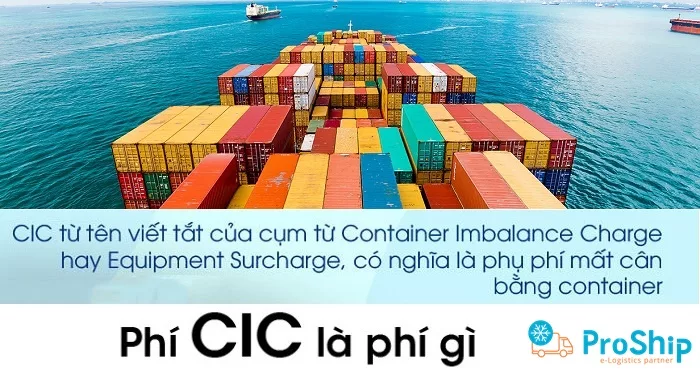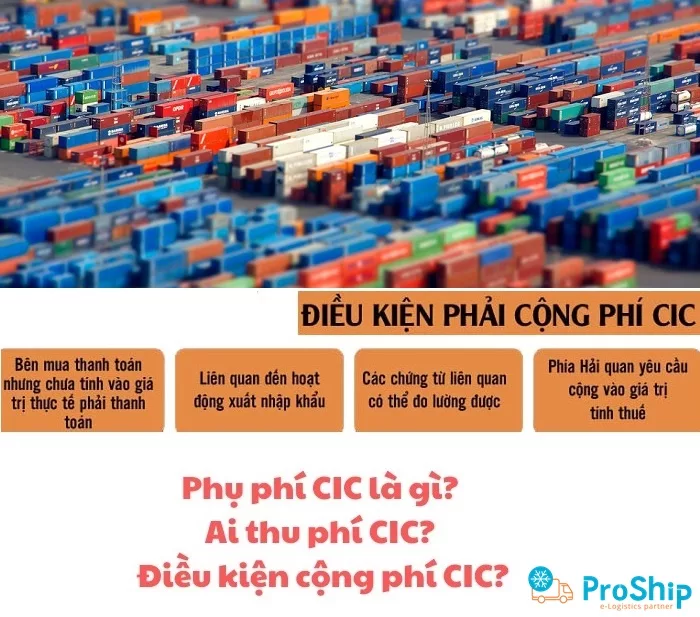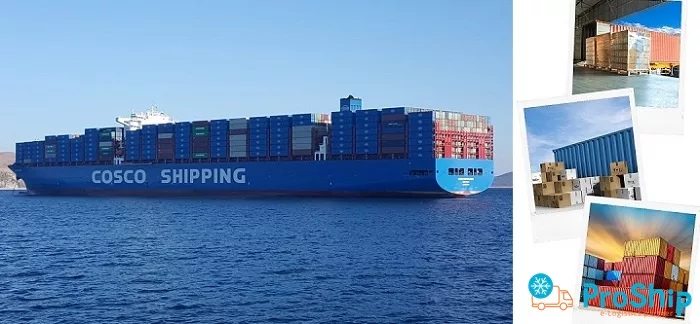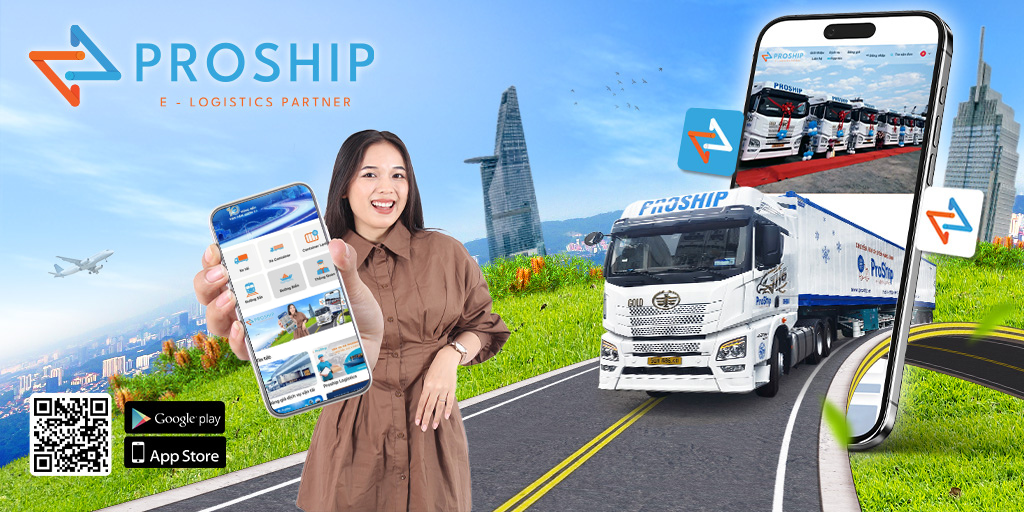x Các DN kinh doanh hàng XNK thắc mắc phí CIC trong vận tải đường biển là gì? Khi nào thu phí CIC?
x Bạn muốn biết quy định, cách tính cũng như ai là người phải trả phụ phí CIC trong vận tải biển?
x Các tư nhân, DN có nhu cầu ghép hàng lẻ với khách khác để vận chuyển đường biển đi các nước?
Phí CIC là phụ phí được hãng tàu thu người xuất khẩu để bù đắp chi phí vận chuyển khi XNK hàng hóa. Proship.vn sẽ đề cập tới những vấn đề mà Tư nhân, DN quan tâm nhằm làm rõ thuật ngữ phí CIC là gì cùng quy định liên quan. Qua đây, chúng tôi cũng giới thiệu “Dịch vụ vận chuyển hàng LCL đi các nước Chính Ngạch giá rẻ”, nếu bạn có nhu cầu ghép hàng với khách khác để tiết kiệm chi phí vận tải hàng đi Mỹ, Đức, Úc, Nhật Bản, Trung Quốc,…có thể tham khảo và sử dụng dịch vụ.
📦 Hotline Liên Hệ Vận Chuyển
🧭 Miền Trung
XEM THÊM: Dịch vụ vận chuyển Container giá rẻ
Phí CIC là gì? Điều kiện cộng phí CIC là gì?
Phí CIC là phí gì?
Phí CIC là loại phí khiến không ít Doanh nghiệp cần xuất nhập khẩu hàng hóa băn khoăn. Nếu bạn làm trong Ngành xuất nhập khẩu chắc hẳn không còn xa lạ với định nghĩ phí CIC là phí gì và những thông tin liên quan đến loại phí này.
Phụ phí CIC là gì? CIC là viết tắt của “Container Imbalance Charge” (Equipment Surcharge), hiểu theo nghĩa đen là phí mất cân bằng container. Đây là một loại phụ phí vận tải đường biển được thu bởi các hãng tàu với mục đích bù đắp chi phí vào việc vận chuyển các container rỗng từ nơi thừa container đến nơi có hàng hóa cần đóng vào container. Lý do chi phí này xuất hiện là sự mất cân bằng về lượng container rỗng. Tình trạng container rỗng không cân bằng phát sinh do các quốc gia có sự mất cân bằng trong cán cân xuất nhập khẩu.
* Ví dụ dễ hiểu như sau: Việt Nam là nước nhập khẩu nhiều hàng từ Trung Quốc về nhưng hàng Việt Nam lại xuất khẩu sang Trung Quốc không nhiều. Việc mất sự cân bằng giữa xuất và nhập khẩu dẫn đến vỏ container rỗng tại Việt Nam nhiều trong khi container đóng hàng bên Trung để chuyển về Việt Nam lại thiếu trầm trọng. Chính vì vấn đề này, hãng tàu cần vận chuyển vỏ container rỗng từ Việt về Trung và thu thêm phí của Doanh nghiệp đã sử dụng xong chiếc vỏ container rỗng đó.

Hiện nay, có nhiều quốc gia nhập siêu như Việt Nam, Mỹ, EU,…sẽ có lượng cont rỗng lớn sau khi nhập khẩu. Ngược lại, các quốc gia xuất siêu như Trung Quốc, Ấn Độ,…lại cần nhiều container rỗng để đóng hàng xuất khẩu. Do đó, việc điều chuyển container rỗng từ nơi không có nhu cầu, tới nơi có nhu cầu sẽ phát sinh chi phí cho hãng tàu, nên hãng tàu mới thu thêm phí CIC để bù đắp lại và được xem như một phần của phí cont. Phí CIC phát sinh tùy thời điểm trong năm, thời điểm mất cân bằng nhiều thì hãng tàu thu còn cân bằng thì không thu.
Điều kiện phải cộng phụ phí CIC
Phí mất cân bằng container chỉ điều chỉnh cộng khi đáp ứng được các điều kiện sau:
- Phụ phí mất cân bằng container do bên mua thanh toán và nó chưa được tính vào giá trị thực tế phải thanh toán;
- Các chứng từ liên quan có thể đo lường được. Trong trường hợp hàng hóa xuất nhập khẩu có khoản điều chỉnh cộng nhưng không có chứng từ liên quan thì không được tính theo phương pháp trị giá giao dịch;
- Liên quan đến hoạt động xuất nhập khẩu hàng hóa;
- Phụ phí mất cân bằng container thường được Hải Quan yêu cầu Doanh nghiệp cộng vào giá trị tính thuế. Do đó, bạn nên chú ý làm rõ khoản phí này trong hợp đồng vận tải với hãng tàu để tránh bị thu quá cao.
>>Xem thêm: Nhãn hàng hóa là gì?
Quy định, cách tính thế nào và ai là người trả phí CIC?
Proship đã giải đáp thắc mắc phí CIC là gì cùng các điều kiện phải cộng vào khoản phụ phí CIC. Tiếp theo đây sẽ là cách tính, thông tin về người trả phí CIC và một số kiến thức liên quan khác. Cụ thể như sau:
Ai sẽ bị thu phí CIC: Shipper hay Consignee?
CIC là loại phí có thể được cộng vào cước vận tải thu shipper (người gửi) hoặc consignee (người nhận). Tùy thuộc vào hợp đồng vận tải của hai bên sẽ quy định cụ thể đâu là bên chịu phí mất cân bằng container. Cụ thể có hai trường hợp:
Trường hợp đóng hàng xuất khẩu
Nếu thiếu container thì hãng tàu buộc phải vận chuyển container thừa đến nơi thiếu để đóng hàng và phát sinh phí CIC. Với tình huống này, phí mất cân bằng container phát sinh trước khi đóng hàng và trước khi về đến cảng nhập đầu tiên. Do đó, phí này sẽ được cộng với cước tàu và xuất hiện trong hợp đồng vận tải với hãng tàu.
* Ví dụ: Công ty A xuất khẩu hàng hóa, nhưng đang đóng hàng thì hết container. Lúc này, hãng tàu sẽ phải chuyển container rỗng từ nơi khác về và làm phát sinh phí CIC ở nước xuất khẩu. Do đó phụ phí mất cân bằng container được cộng vào cước tàu và ghi trong hợp đồng vận tải với hãng tàu.
Trường hợp hàng hóa về đến cảng nhập đầu tiên
Hàng hóa sau khi về đến cảng nhập nhưng nước nhập không có hàng ngay để chuyển cont về lại cảng xếp hàng thì họ phải trả phụ phí mất cân bằng cont để hãng tàu chuyển cont rỗng từ nơi không có nhu cầu đến nơi có nhu cầu.
* Ví dụ: Đối với lô hàng nhập khẩu, sau khi hàng về đến cảng dỡ hàng, các nước nhập khẩu không chờ đến khi có hàng để xuất khẩu lại qua cảng xếp hàng ở nước xuất khẩu ban đầu. Do đó, để vận chuyển container rỗng từ cảng dỡ hàng về cảng xếp hàng, hãng tàu phải tiến hành vận chuyển nên họ sẽ thu thêm phí mất cân bằng container.
Cách tính phụ phí CIC như thế nào?
Thông thường, phí mất cân bằng container sẽ được hãng tàu thu một lần tại nước xuất khẩu hoặc nhập khẩu. Tuy nhiên, theo thông lệ thì khoản phí này thường được thu tại cảng nhập khẩu. Do đó, để biết được bên nào cần thanh toán phí mất cân bằng container, từ khi booking tàu hai bên cần thỏa thuận rõ phí sẽ do bên nào chi trả. Việc thống nhất bên chịu phí sẽ tránh được tình trạng hãng tàu thu phí 2 lần.
Trong trường hợp người mua thanh toán CIC, phụ phí này không được tính thêm vào giá bán hàng hóa. Ngược lại, nếu người bán chi trả CIC thì phụ phí được cộng vào giá bán hàng hóa. Hiện nay, mức phí CIC đang dao động khoảng 85USD/cont 20 feet và 170 USD/cont 40 feet. Đây không phải mức phí cố định mà có thể thay đổi tùy thuộc vào từng thời điểm khác nhau.

Khi nào thu phí mất cân bằng Container?
Với nhiều người, nhất là những người ít khi vận chuyển hàng hóa theo đường biển, họ thường không biết khi nào phải nộp phụ phí mất cân bằng container. Thực tế, phụ phí mất cân bằng container sẽ được thu theo một mức nhất định và chỉ áp dụng vào từng tuyến vận chuyển.
Theo đó, nếu các tuyến vận chuyển được thực hiện từ các quốc gia xuất siêu thì đa phần đều sẽ phải đóng khoản phí này. Bởi vì, họ thường thiếu hụt container rỗng để đóng hàng xuất khẩu. Đặc biệt, vào những thời điểm hoạt động mua bán diễn ra sôi động như cuối năm, các dịp lễ,…nhu cầu cần sử dụng container rỗng tăng cao. Do đó, phí mất cân bằng container thường được thu nhiều hơn.
📦 Hotline Liên Hệ Vận Chuyển
🧭 Miền Trung
NÊN ĐỌC: Bảng giá vận chuyển Container Lạnh chi tiết
Lý do tại sao phụ phí CIC trong vận tải biển còn nhiều bất cập?
Khi đã biết rõ phí CIC là gì thì khi đối chiếu với thực tế, Doanh nghiệp sẽ dễ dàng nhận ra việc thu phụ phí thiếu cont rỗng còn khá nhiều bất cập. Điều này được thể hiện dưới góc độ sau:
Phát sinh phí CIC là do thời điểm mất cân bằng vỏ container
Về lý thuyết, phí CIC phát sinh là do thời điểm mất cân bằng vỏ container nên hãng tàu phải thu phí chuyển cont rỗng về nơi còn thiếu. Khó có hãng tàu nào đảm bảo đủ vỏ tuyệt đối tại các cảng, các quốc gia nên việc phát sinh phí CIC lúc này là hợp lý. Tuy nhiên, hãng tàu thu phí này chỉ dựa trên cơ sở nhận định của chính mình, còn bản thân Doanh nghiệp xuất nhập khẩu thuê cont đó không biết khi nào thiếu/thừa cont rỗng và thật sự có bị mất cân bằng container giữa các khu vực hay không.
Từ đó có một thực tế đang tồn tại là dù Doanh nghiệp đã nắm rõ CIC là phí gì và biết không phải lúc nào vỏ container rỗng cũng mất cân bằng, hãng tàu cũng không bị thiếu vỏ cont, nhưng hầu hết các hãng tàu lại cào bằng việc thu phí CIC như một mặc định. Điều này đã gây bức xúc trong các Doanh nghiệp khi họ là người phải chịu thiệt một cách vô lý.
Phí CIC được các hãng tàu thu ngày càng cao và không hợp lý
Nhiều Doanh nghiệp “kêu trời” vì bị các hãng tàu thu phí CIC với mức thu rất cao. Nếu trước đây, mức phí chỉ 40 USD/container 20 feet nhưng càng ngày càng tăng và hiện nay có thời điểm lên đến 100 – 120 USD. Mặc dù việc thiếu cont rỗng là có thật nhưng không nghiêm trọng để đẩy giá cao lên như thế. Thậm chí hãng tàu còn thu phí CIC cả người xuất hàng lẫn nhập hàng để tăng giá cước, điều này hoàn toàn không hợp lý.
Proship Logistics có cung cấp Dịch vụ gom hàng, xuất nhập khẩu hàng lẻ đi các nước Chính Ngạch đường biển không?
CÔNG TY CỔ PHẦN PROSHIP chúng tôi chuyên cung cấp “Dịch vụ xuất nhập khẩu hàng lẻ, vận chuyển hàng LCL đi các nước Chính Ngạch giá rẻ” với quy trình chuyên nghiệp, thận trọng trong mọi khâu quan trọng nhất để đảm bảo hàng đi theo khối, gom chung từ nhiều khách lẻ nhưng vẫn an toàn tuyệt đối, tránh thất lạc, hư hại làm ảnh hưởng tới kế hoạch sản xuất – kinh doanh của Tư nhân/Doanh nghiệp.
Cụ thể, Proship Logistics với vai trò là người gom hàng (Consolidator) sẽ gom các lô hàng lẻ (LCL) của nhiều Chủ hàng tại Kho đóng hàng lẻ (CFS), sắp xếp, phân loại và đóng chung vào một container, sau đó thu xếp vận chuyển từ cảng xếp hàng tới cảng đích, việc kết hợp đóng chung như vậy gọi là Gom hàng (Consolidation). Phía chúng tôi sẽ cung cấp lịch trình đóng hàng lẻ (LCL) cố định hằng tuần tới nhiều điểm đến trên khắp thế giới (Mỹ, Đức, Úc, Nhật Bản, Hàn Quốc, Thượng Hải, Trung Quốc,…) giúp khách chủ động lên kế hoạch chuyển gửi hàng chính xác trước đó.

Phương thức vận tải – giao nhận hàng LCL tại Proship
Các phương thức vận chuyển hàng lẻ LCL Chính Ngạch theo khối Proship đang áp dụng:
- Vận chuyển hàng LCL từ Cảng tới Cảng;
- Vận chuyển hàng lẻ từ Cảng tới Kho;
- Vận chuyển hàng lẻ LCL từ Kho tới Kho;
- Vận chuyển hàng hóa tận nơi theo yêu cầu;
- Các dịch vụ đi kèm khác tùy nhu cầu cụ thể của khách hàng.
Đối tượng khách hàng của Proship Logistics
Proship hướng tới các đối tượng khách hàng sau khi XNK hàng lẻ Chính Ngạch đường biển:
- Các Tổng Công ty, các Công ty trong và ngoài nước có nhu cầu vận chuyển hàng hóa;
- Các Nhà máy, các công trình, các Tổng đại lý và Dịch vụ hàng hóa nội địa, xuất nhập khẩu Quốc tế;
- Các DN vừa và nhỏ có nhu cầu vận chuyển đường biển tuyến Quốc tế và xuất nhập khẩu cho thời gian nhanh nhất và tiết kiệm các chi phí nhỏ nhất.
Lý do chọn Dịch vụ xuất nhập khẩu hàng lẻ Chính Ngạch tại Proship
Lý do khách hàng nên chọn Dịch vụ gom và vận chuyển hàng lẻ đi các nước bằng đường biển, chính bởi:
- Hệ thống đại lý, đối tác rộng khắp các quốc gia nên quý khách cứ an tâm vì hàng được gửi đi nhanh nhất;
- Giá cước DV vận chuyển hàng LCL đi các nước Chính Ngạch luôn rẻ hợp lý, DV chuyên nghiệp, thủ tục nhanh chóng;
- Dịch vụ gom hàng tại các trạm chuyển tiếp quốc tế, phủ sóng dịch vụ tới các tuyến vận chuyển quá cảnh;
- Đội ngũ nhân viên có kinh nghiệm, tư vấn báo giá nhanh kịp thời cho khách hàng;
- Vận chuyển trực tiếp tới/từ các cảng Bắc Mỹ, Nam Mỹ, Châu Âu và Châu Á;
- Có nhiều chuyến gom hàng xuất khẩu và nhập khẩu trực tiếp hàng tuần;
- Gom hàng tại nhiều nước (Mỹ, Đức, Úc, Nhật Bản, Trung Quốc,…) và lưu kho hàng chờ giao nhận;
- Kho CFS thu gom hàng lẻ đặt tại các vị trí chiến lược, tạo ra giải pháp LCL hiệu quả và hoàn chỉnh cho khách hàng;
- Quý khách có thể theo dõi đơn hàng trực tiếp qua Websites hoặc qua Đội ngũ nhân viên tư vấn;
- Chính sách bồi thường hàng hóa theo giá thị trường nếu phát hiện lỗi do vận chuyển;
- Nhiều gói DV: Vận chuyển CY-CY, Vận chuyển Door to Door, Vận chuyển theo các điều khoản Incoterms trong hợp đồng.
Trên đây là thông tin mà Proship muốn gửi đến bạn đọc để giải đáp phí CIC là gì cùng các kiến thức liên quan. Theo đó, một khi hãng tàu đã thu phí CIC thì bạn buộc phải đóng, nếu không đóng hãng tàu sẽ không phát hành D/O để nhận hàng. Mong rằng, bài chia sẻ này sẽ giúp ích cho nhiều Doanh nghiệp trong quá trình xuất, nhập khẩu hàng hóa đường biển…Và để được cung cấp Dịch vụ vận chuyển hàng LCL đi các nước Chính Ngạch giá rẻ, quý khách vui lòng liên hệ 0909 344 247.
📦 Hotline Liên Hệ Vận Chuyển
🧭 Miền Trung

